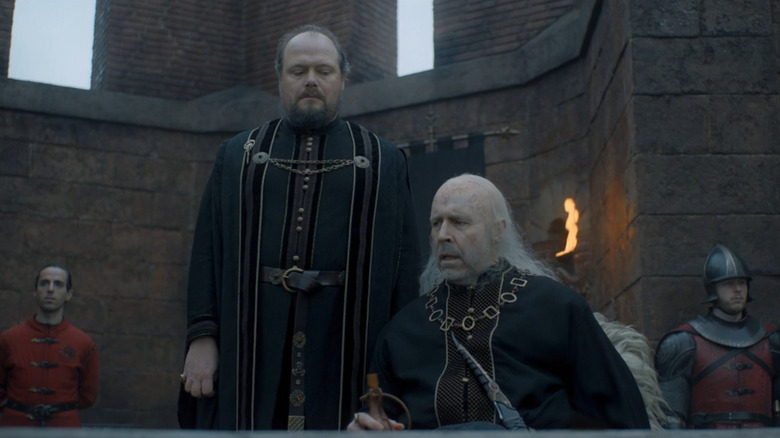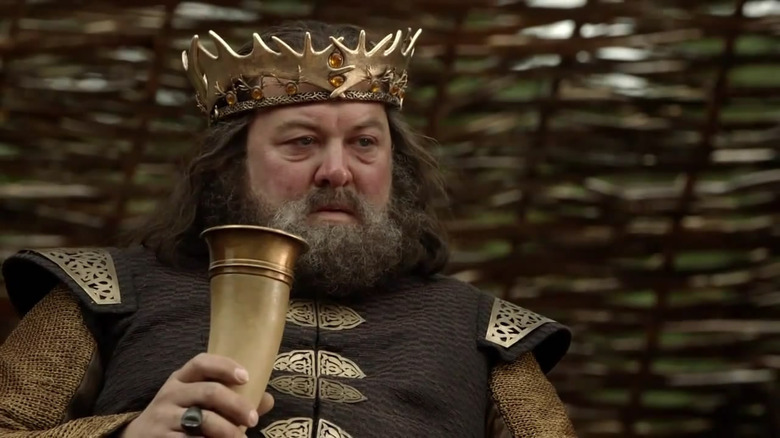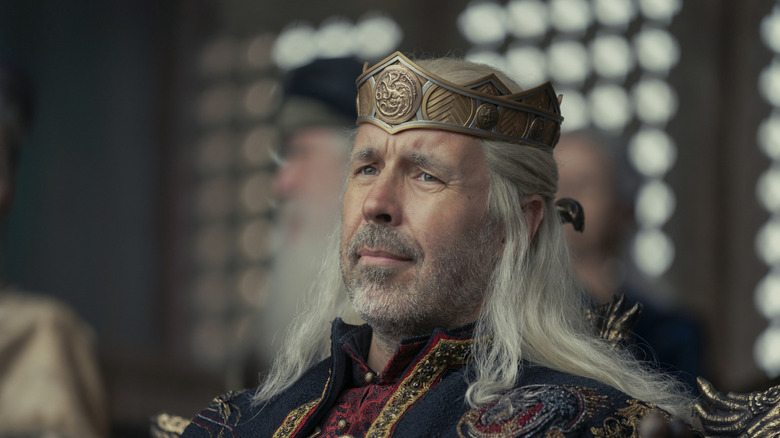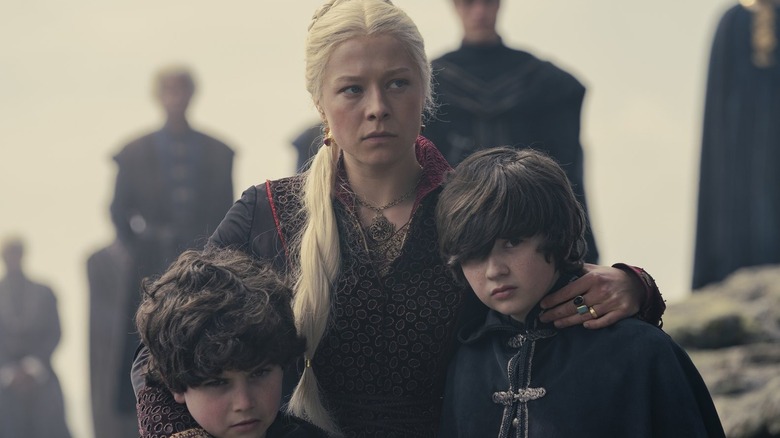How Viserys Targaryen Just Proved Himself A Better King Than Robert Baratheon
Most people can agree that Viserys Targaryen (Paddy Considine) isn't all that great at his job. Yes, he's managed to avoid any major wars, but he's been remarkably complacent about the growing rivalries inside his own family. After over a decade, you'd think he'd have done a little more to force Alicent (Olivia Cooke) and Rhaenyra (Emma D'Arcy) to put aside their differences. His decision to marry Alicent at all (his daughter's best friend rather than the daughter of a major ally) was particularly silly and poorly handled.
And yet somehow, by "Game of Thrones" standards, he's one of the best rulers we've seen on screen. Unlike Daenerys, he hasn't burned down King's Landing. Unlike Cersei, he hasn't alienated all the other houses and accidentally unleashed a puritanical religious mania throughout the city. Unlike Joffrey, he's not a full-on sadist. Besides Bran, whom audiences only got to see as king for a couple of minutes on-screen, the character Viserys parallels the most from the original series is Robert Baratheon (Mark Addy).
Much like Robert, Viserys is the first king we've gotten to know in his show, and him staying alive seems to be the only thing preventing total chaos from being unleashed. Much like Robert, ruling the Iron Throne seems to have aged Viserys poorly; throughout the prequel's constant jumps through time, it always feels like a minor miracle that Viserys is somehow still alive. There are a lot in common between the two characters, but if last night's episode is any indication, Viserys may be the better ruler overall.
The many callbacks to 'The Kingsroad'
As you may recall, the second episode ever of "Game of Thrones" features a scene where Joffrey needlessly antagonizes Arya and her lower-class friend Mycah. Things quickly get out of hand: soon Joffrey is swinging a real sword at Arya, then Arya's direwolf comes in and chomps at Joffrey's wrist. It feels like a satisfying moment to see Joffrey get taken down a peg, but unfortunately the aftermath of the event makes it clear it wasn't worth it. When Cersei hears what happened, she demands that Arya's direwolf gets put down as punishment. When Arya's direwolf is nowhere to be found, she demands that Sansa's direwolf, Lady, gets killed instead.
It's a dark, frustratingly unfair resolution, one that only serves to foreshadow the growing divide between the Stark and Lannister houses. Perhaps even more so than Jaime throwing Bran out the window, this sequences of events is a clear sign of the war that would eventually break out just a handful of episodes later.
Sound familiar? The characters and the exact circumstances are different, but this basic scenario has already played out nearly 200 years earlier within the Targaryen family. Except instead of Ned's kids accidentally hurting one of Cersei's kids a little too harshly, this time it's one of Rhaenyra's kids maiming Alicent's.
Much like Cersei, Alicent refuses to accept the idea that her son was in any way responsible for what happened. (Aemond is no Joffrey, but he still handled the situation terribly.) With both women, their reaction to the incident highlights the tensions in their marriage: both Viserys' and Robert's gut reaction is to deny their wife's demand. The difference, of course, is that Viserys follows through.
The chad Viserys
Did anyone else's stomach drop when Alicent demanded one of Rhaenyra's kids' eyes get carved out? She commands Cristin Cole to do it and the guy seems perfectly willing (because Cole is the worst), and for a moment it seems like we're getting a repeat of "The Kingsroad." This show's made it abundantly clear that it's more than willing to let things play out in agonizingly unjust ways, so for a second it actually feels like we're about to watch a grown man maim a child under the guise of law and order.
Luckily, Viserys puts a stop to it. Not only does he declare the matter settled, but he also announces that if anyone else ever questions the legitimacy of Rhaenyra's kids ever again, they'll have their tongues cut out. It's a reminder of one of Viserys' best attributes: the guy really does love his daughter, and he's going stick up for her no matter what. Yes, even if that means pretending as if her three black-haired children aren't obviously bastards.
It's a moment that reminds us just how poorly Robert would handle his similar predicament two hundred years later. Yes, his wife demanded the death of Lady, but as "House of the Dragon" makes clear, Robert didn't actually need to listen to her. He could've put his foot down and forbade the pointless killing of an innocent animal. Viserys, for all his faults, was able to stand up to his wife when he knew she was going too far.
Is honor overrated?
The other "Game of Thrones" character who comes out of this episode looking a little worse is Ned Stark (Sean Bean), who was the one who undertook the execution of poor Lady. Ned isn't happy at all to kill her, but he grits his teeth and does it anyway because that's what his king orders him to do. It's not like the show lets him off the hook for this, exactly — the difference between honor and the right thing is a constant dilemma Ned struggles with — but it's something that comes across a little differently after watching "HotD."
Ned may have handled the situation as honorably as he knew how, but maybe the morally correct thing to do was to ignore his honor altogether. What if he'd done what Rhaenyra did, and defend her family members through any means necessary?
Both Viserys and Rhaenyra are far less honorable than Ned. They both know damn well that Rhaenyra's kids are bastards, and Viserys seems plenty aware on how wrong it is to cut someone's tongue out for pointing out that blonde hair + blonde hair =/= pitch black hair. And yet in the end, it's the two characters' shameless disregard of honor that saves the day.
The situation that plays out in "Driftmark" is perhaps more complicated than the situation in "The Kingsroad." Aemond is more sympathetic than Joffrey and Rhaenyra is far less sympathetic than Ned. Of course, that's the main difference between the two shows so far: whereas "Game of Thrones" had the Starks to root for, there is no clear-cut good family to root for here. Neither Rhaenrya or Viserys are as honorable as Ned Stark, but if this latest episode is any indication, that's probably for the best.



